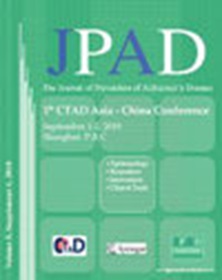Symposia
IF 7.8
3区 医学
Q1 CLINICAL NEUROLOGY
引用次数: 0
Abstract
Introduction: The amyloid hypothesis proposes that Aβ peptides are intimately involved in the etiology of Alzheimer’s disease (AD) via their aggregation to form toxic complexes that lead to neurodegeneration. Aβ is produced via sequential proteolytic cleavage of the parent molecule, amyloid precursor protein, by β-secretase (BACE1) followed by γ-secretase. Inhibition of BACE1 is a potential novel therapeutic strategy for slowing or halting progression of AD by reducing Aβ production. This approach differs from previous anti-amyloid approaches using monoclonal antibodies to clear Aβ. In the first large-scale clinical trial (EPOCH) of a BACE1 inhibitor, verubecestat doses of 12 mg and 40 mg were ineffective at slowing the rate of cognitive or functional decline over 78 weeks in participants with clinically diagnosed mild-to-moderate AD, despite reducing cerebrospinal fluid (CSF) Aβ levels by 63-81% (Egan et al. NEJM 2018;378:1691-1703). One interpretation of these findings is that treatment at the AD dementia stage is too late in the disease process. A second large trial (APECS; clinicaltrials.gov NCT01953601) was initiated in 2013 to evaluate verubecestat in participants with prodromal AD. Eligible participants had subjective memory decline with objective memory impairment and were amyloid positive (determined by amyloid imaging PET scan or CSF tau: Aβ42 ratio) but did not meet criteria for dementia. A decision to terminate the APECS trial was made in February 2018 following a recommendation by the external Data Monitoring Committee, which concluded that it was unlikely that positive benefit/risk could be established if the trial continued to its scheduled completion in 2019. Objectives: The objectives of this symposium are to present key efficacy and safety findings from the APECS trial and to have a panel of experts discuss the findings and implications for future development of BACE1 inhibitors. Results will be unveiled at CTAD. Discussion: The findings from the APECS trial suggest that blocking Aβ production at the prodromal AD stage does not slow clinical progression. Because the deposition of Aβ takes place years before the prodromal stage, it is possible that administration of an antiamyloid agent like verubecestat may be effective if given even earlier in the disease process. An alternative possibility is that the production of Aβ peptides may not play a major causal role in the pathophysiology of AD. Conclusions: Verubecestat was not effective in slowing clinical progression in participants with prodromal AD.座谈会
淀粉样蛋白假说提出,Aβ肽通过聚集形成毒性复合物导致神经退行性变,与阿尔茨海默病(AD)的病因密切相关。Aβ是通过β-分泌酶(BACE1)和γ-分泌酶对淀粉样蛋白前体亲本分子的连续蛋白水解裂解产生的。抑制BACE1是一种潜在的新的治疗策略,通过减少a β的产生来减缓或停止AD的进展。这种方法不同于以往使用单克隆抗体清除Aβ的抗淀粉样蛋白方法。在BACE1抑制剂的第一次大规模临床试验(EPOCH)中,verubecestat剂量为12 mg和40 mg对临床诊断为轻度至中度AD的参与者在78周内减缓认知或功能下降的速度无效,尽管脑脊液(CSF) a β水平降低了63-81% (Egan等)。NEJM 378:1691 2018; 1703)。对这些发现的一种解释是,在阿尔茨海默病痴呆阶段的治疗在疾病过程中太晚了。第二次大型试验(APECS;clinicaltrials.gov (NCT01953601)于2013年启动,旨在评估verubecestat对前驱AD患者的治疗效果。符合条件的参与者有主观记忆衰退和客观记忆障碍,淀粉样蛋白阳性(通过淀粉样蛋白成像PET扫描或脑脊液tau: a - β42比值确定),但不符合痴呆标准。根据外部数据监测委员会的建议,终止APECS试验的决定于2018年2月做出,该委员会的结论是,如果试验继续进行到2019年按计划完成,则不太可能确定积极的收益/风险。目的:本次研讨会的目的是介绍APECS试验的关键疗效和安全性发现,并由专家小组讨论这些发现和对BACE1抑制剂未来发展的影响。结果将在贸发会议上公布。讨论:APECS试验的结果表明,在AD前驱期阻断Aβ的产生并不会减缓临床进展。由于Aβ的沉积发生在前驱期前几年,因此在疾病早期给予抗淀粉样蛋白药物如verubecestat可能有效。另一种可能性是,β肽的产生可能在阿尔茨海默病的病理生理中不起主要的因果作用。结论:Verubecestat对减缓前驱AD患者的临床进展没有效果。
本文章由计算机程序翻译,如有差异,请以英文原文为准。
求助全文
约1分钟内获得全文
求助全文
来源期刊

Jpad-Journal of Prevention of Alzheimers Disease
CLINICAL NEUROLOGY-
自引率
7.80%
发文量
85
期刊介绍:
The JPAD « Journal of Prevention of Alzheimer’Disease » will publish reviews, original research articles and short reports to improve our knowledge in the field of Alzheimer prevention including : neurosciences, biomarkers, imaging, epidemiology, public health, physical cognitive exercise, nutrition, risk and protective factors, drug development, trials design, and heath economic outcomes.
JPAD will publish also the meeting abstracts from Clinical Trial on Alzheimer Disease (CTAD) and will be distributed both in paper and online version worldwide.
 求助内容:
求助内容: 应助结果提醒方式:
应助结果提醒方式:


